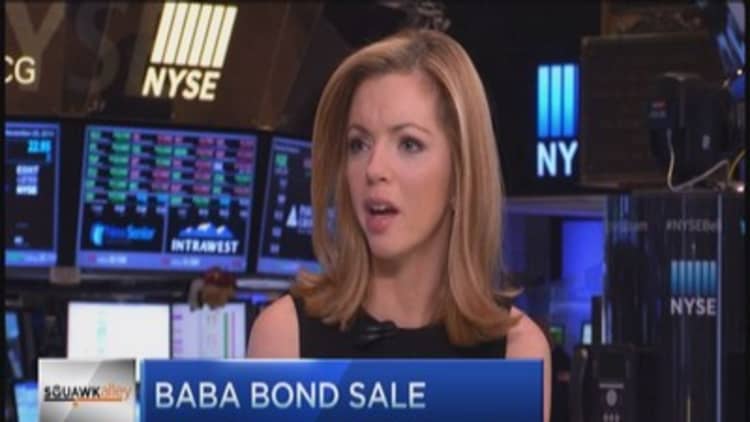


Out with the Americans and in with the Chinese—that could be the next trend in U.S. bond markets as demand for high-quality investments outruns supply.
This week, Chinese e-commerce giant Alibaba priced $8 billion in U.S. dollar bonds with maturities spanning from three to 20 years. The move follows its highly successful IPO in late September. Demand for the deal is extraordinary: Alibaba has received orders for well over $50 billion in bonds and may expand the offering size slightly to accommodate them, according to a person familiar with the matter.
Alibaba declined to comment to CNBC.
Why the appetite? Certainly, Alibaba is a high growth company that some stock investors see as a once-in-a-lifetime opportunity. The stock has soared 64 percent since its IPO.
But bond investors don't think that way. They are far more concerned with the stability of Alibaba's future cash flows that will eventually allow it to repay what it borrows.
In that regard, Alibaba isn't quite as exciting. The company is rated A1 by Moody's, or several notches below the highest possible rating enjoyed by a handful of blue chip companies such as Microsoft.
Moody's says that Alibaba has a well-established brand name but also points out certain risks. One is that Alibaba's history as a public company is short. There are also questions about how Alibaba can expand its business scope both within and outside China.
Despite those risks, investors seem to be falling all over each other to buy Alibaba bonds. Another explanation may be that there simply aren't that many new bonds up for sale in the U.S. market these days.
Read MoreApple's latest move: Acting like a hedge fund
Indeed, the last few weeks have seen a wave of U.S. companies issue bonds in euros rather than dollars to take advantage of lower rates on the continent. Apple sold 2.8 billion euros in bonds earlier this month in its first non-dollar deal. It was followed by big U.S. issuers including 3M, Walgreen, and most recently IBM.
So far this year, U.S. companies have sold $79 billion in euro-denominated bonds, the highest level since the same period of 2007, according to Dealogic. Given the huge gap between dollar and euro interest rates at the moment, there's reason to believe the trend will continue for some time.
Read MoreIs Apple disrupting the U.S. bond market?
Back in the U.S., Alibaba and others are already helping fill the gap. Chinese companies have sold $28 billion in U.S. dollar bonds so far this year, the highest on record by a long way, Dealogic says. Chinese issuers also account for 5.3 percent of total U.S. dollar bonds issued by foreign companies. That's up from 0.2 percent in 2009.
What does the Chinese money invasion mean for U.S. investors? One issue is that Chinese corporate governance structures are different those in the U.S. Alibaba is actually a Cayman shell company. Indeed, Moody's pointed out that there are "potential contingent liabilities" associated with a private company called Ant Financial Services Group that is separate from Alibaba but controlled by its senior management.
Read MoreChina wants to build the world a railway
In theory, the Cayman domicile could be abused because local laws there are somewhat laxer than Securities and Exchange Commission rules. Disclosure of material information, for instance, isn't required as quickly in the Cayman Islands.
In practical terms, a large, high profile company such as Alibaba is likely to hold itself to a higher standard. Baidu, China's version of Google, is also a Cayman company and hasn't run into any major problems linked to its Cayman listing.
Another issue to consider is what happens if more Chinese companies tap U.S. bond markets. In the unfortunate event of another U.S. credit crisis, China could find itself much more affected than in the 2008 crisis, according to Brian Reynolds, chief market strategist at Rosenblatt Securities. "When the U.S. credit boom ends, bonds of Chinese companies are going to suffer," he said.
Last time around, Chinese companies had almost no connection to the U.S. credit market. That allowed China to continue growing apace while much of the West fell into recession. "The more the Chinese become hooked on U.S. credit, the more they have to worry," Reynolds said.

